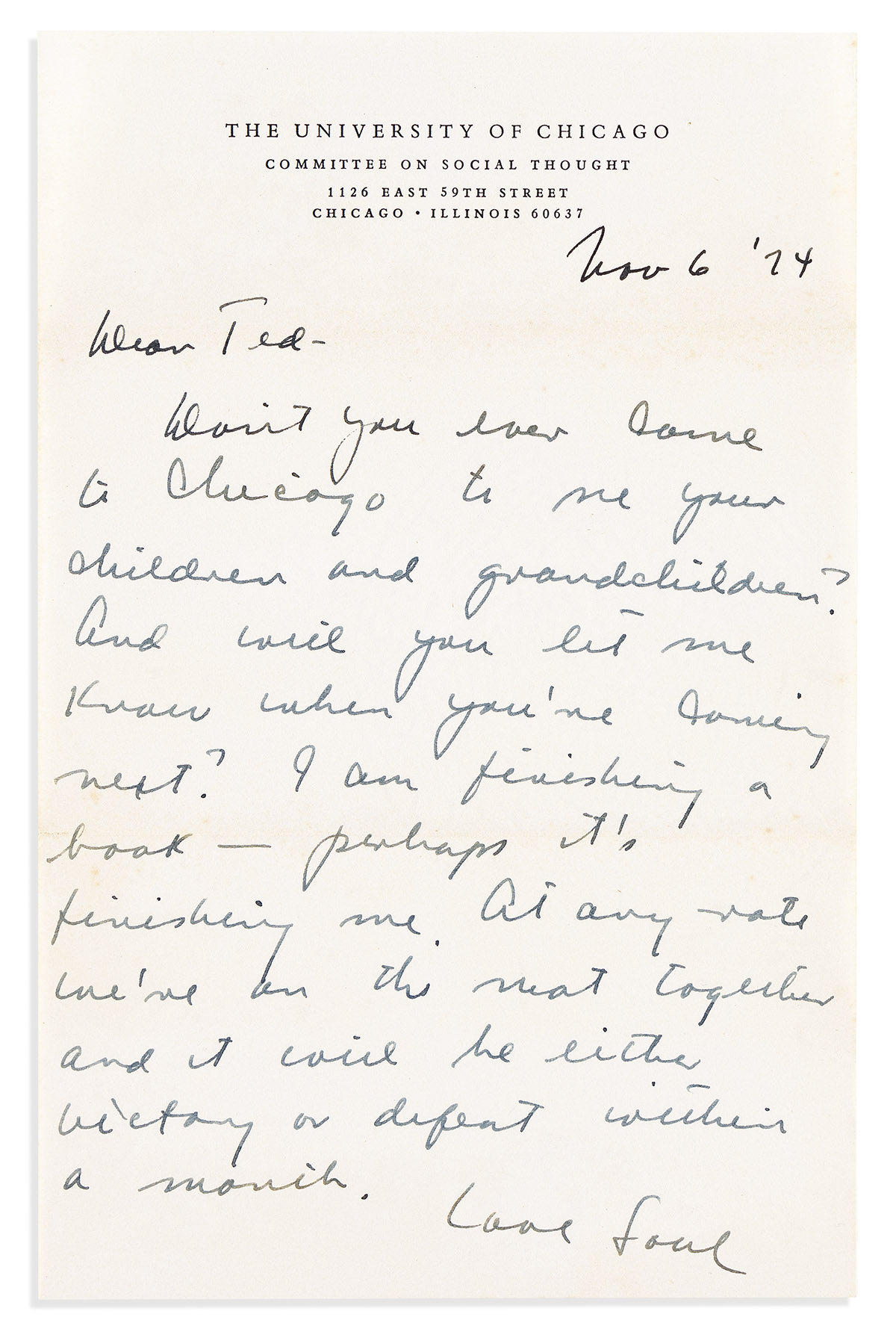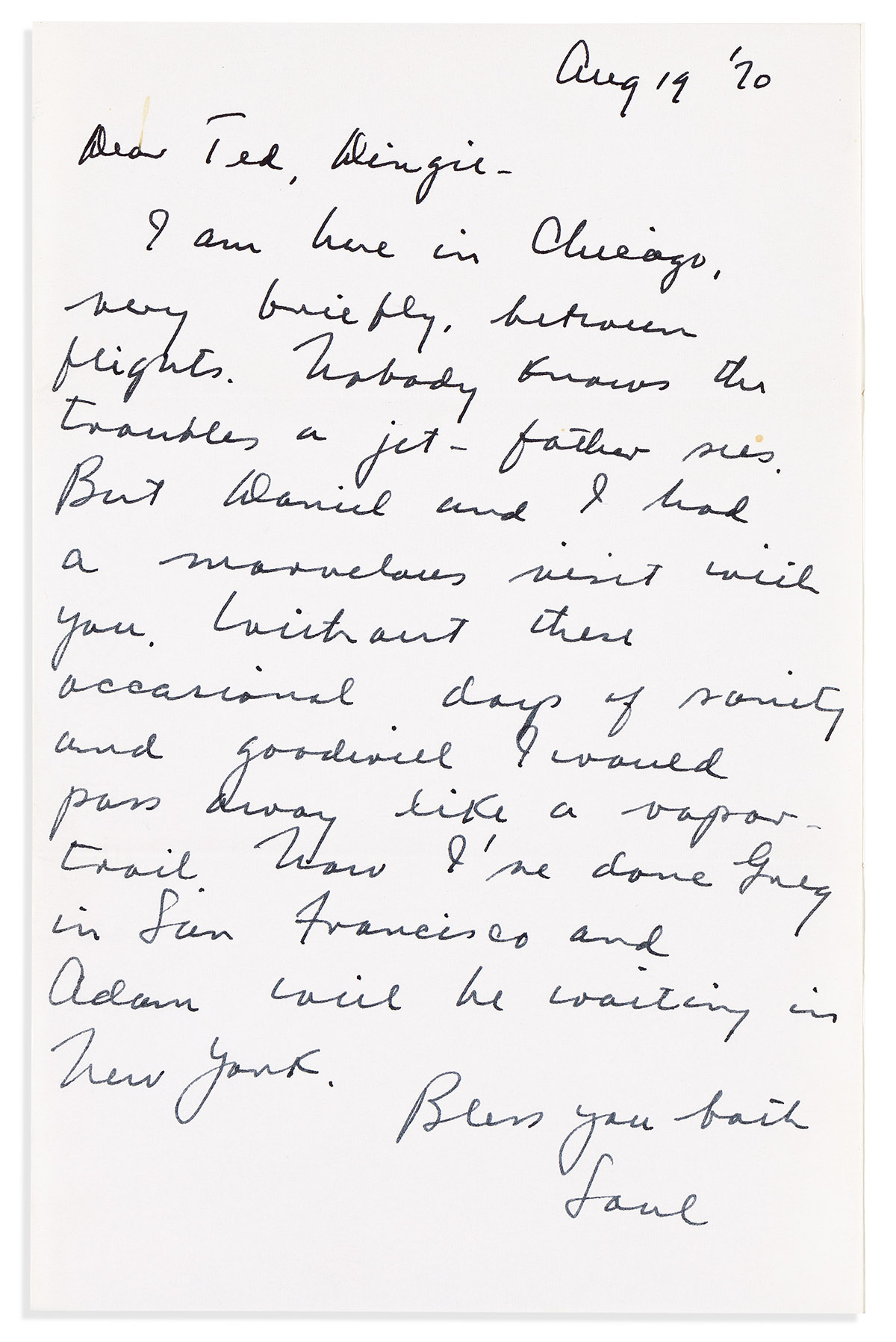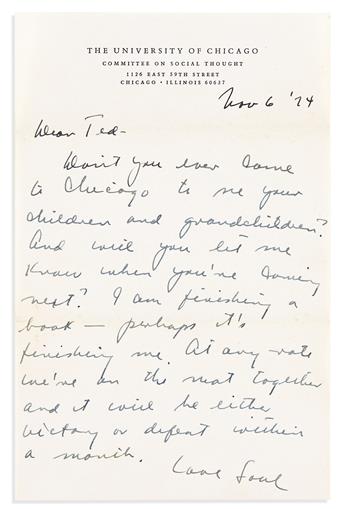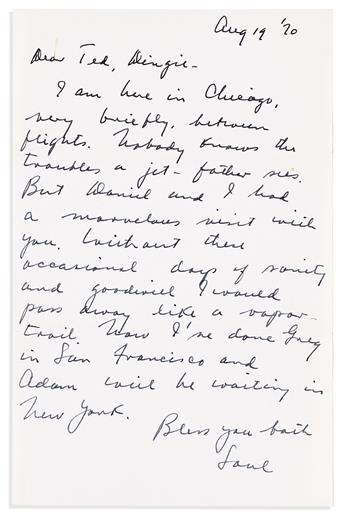Sale 2686 - Lot 121
Unsold
Estimate: $ 3,000 - $ 4,000
LETTERS TO HIS UNDERGRAD ENGLISH PROF WHO "LIVED BY BLAKE AND SHAKESPEARE" BELLOW, SAUL. Archive of 11 letters, each Signed, "Saul" or in full, to his English instructor at Northwestern, Edward Buell Hungerford ("Ted"), his wife ("Dingie"), or their daughter Susan, including 8 ALsS and 3 TLsS, mentioning his difficulties writing Henderson the Rain King (1959), Humboldt's Gift (1975), and To Jerusalem and Back (1976), discussing how his young self could not have written Him with His Foot in His Mouth and Other Stories (1984), and describing to Hungerford's daughter his love for her father and the circumstances of their meeting. Together 16 pages, 8vo, some on "University of Chicago" or personal stationery; generally good condition. A few with the original envelope. Vp, 1959-88
Additional Details
24 February 1959: ". . . We've been in Minneapolis since September. The farm made Sandra stir-crazy, and I can't blame her for that. Re-writing the book three or four times took something out of me [Henderson the Rain King]. No wonder my adolescent son says I look like an old goat. . . . I have had a devil of a time, we all do, but this stretch of road was rough, especially rough. . . .
"I congratulate you and Dingie on the grandchild. I never agreed with Rabbi ben Ezra, but perhaps I'd better think again [Robert Browning's poem, 'Rabbi Ben Ezra,' begins, 'Grow old along with me! /
The best is yet to be']."
6 November 1974: ". . . I am finishing a book--perhaps it's finishing me. At any rate we're on the mat together and it will be either victory or defeat within a month [Humboldt's Gift]."
18 August 1976: "I was amused by your paper maché birds, and touched, too. I like them far better than Picasso's dove which is too accomplished for my taste, lacking in innocence. . . . No sooner was 'Humboldt' finished than I found myself writing a book about Israel. The subject was not one I knew well. I had always avoided it, in fact. But there it suddenly was, and I was obliged to do it even though I was in a depleted state. It seems to me that I wear out my lining, as it were, in writing anything that I take seriously. No I wasn't adequately lined when I began the Israel book. It made me fretful, jumpy, incapable of normal behavior. To write a letter was far too much for me. Too many compressed and dire feelings. I was good for nothing but the writing of my book, and I don't know that the book is any good [To Jerusalem and Back]. . . ."
26 December 1979: "Your '80' takes me by surprise. Never thought of you that way. I count backward to 1934 when we met, and then, yes, of course, the numbers are there. But then if you are one of those revolution-and-independence . . . old men, and I guess you probably are one, you're okay. . . ."
5 February 1983, TLS: "I hoped that Him etc. would give you pleasure [Him with His Foot in His Mouth and Other Stories]. For a very long time I saw nothing wrong with the opinion of modern orthodoxy that writers shouldn't bother their minds with anything except sober 'creativity' but as I grow older I begin to think there is a kind of egotistical puritanism in such an outlook. Many people were pleased with Mr. Shawmut--and why not? . . . Writing the story made me extremely happy. It seemed to give me a chance to gather up my scattered spirits and energies.--Is it possible that I may be some kind of manic-depressive? . . ."
10 September 1988, to "Dear Susan": ". . . In 1934, a sophomore, I discovered Ted at N[orthwestern] U[niversity]. I could talk to him. My mother had just died, I was too young to know how [to] grieve and Ted was the one adult I was able to turn to. More than that, he was 'American.' I was the child of immigrants. Where I might have expected chill distance, I found intimacy, warmth and naturalness. Through your parents I learned that the 'others' also were human. Ted was a special case, of course. Few Americans lived by Blake and Shakespeare. How did Ted manage it?
"There were marvelous surprises: When Ginsberg published Howl etc., Ted told me in his laconic quiet-spoken, blue-eyed manner, 'I've always talked to myself in this way'--the Ginsberg direct sex-talk.
". . . He was all of a piece, quite simply out-of-it and yet always at the center of things. . . . He had no deceit, no sophistication . . . ."
With--Three items: Mark Smith. Typed Letter Signed, "Mark," to Edward Buell Hungerford ("Dear Ted"), thanking for comments about his novel, Doctor Blues (1983), and mentioning that another would soon be published (Smoke Street [1984]). 1½ pages, 8vo, "University of New Hampshire" stationery, written on recto and verso of a single sheet. Durham, 15 December 1983 • Edward Buell Hungerford. Two books, unsigned: Fighting Frigate; Poets in Progress. Each 8vo, publisher's cloth, the first in worn dust jacket. Chicago: Follett Publishing Company, (1947); (Chicago): Northwestern University Press, 1967.
"I congratulate you and Dingie on the grandchild. I never agreed with Rabbi ben Ezra, but perhaps I'd better think again [Robert Browning's poem, 'Rabbi Ben Ezra,' begins, 'Grow old along with me! /
The best is yet to be']."
6 November 1974: ". . . I am finishing a book--perhaps it's finishing me. At any rate we're on the mat together and it will be either victory or defeat within a month [Humboldt's Gift]."
18 August 1976: "I was amused by your paper maché birds, and touched, too. I like them far better than Picasso's dove which is too accomplished for my taste, lacking in innocence. . . . No sooner was 'Humboldt' finished than I found myself writing a book about Israel. The subject was not one I knew well. I had always avoided it, in fact. But there it suddenly was, and I was obliged to do it even though I was in a depleted state. It seems to me that I wear out my lining, as it were, in writing anything that I take seriously. No I wasn't adequately lined when I began the Israel book. It made me fretful, jumpy, incapable of normal behavior. To write a letter was far too much for me. Too many compressed and dire feelings. I was good for nothing but the writing of my book, and I don't know that the book is any good [To Jerusalem and Back]. . . ."
26 December 1979: "Your '80' takes me by surprise. Never thought of you that way. I count backward to 1934 when we met, and then, yes, of course, the numbers are there. But then if you are one of those revolution-and-independence . . . old men, and I guess you probably are one, you're okay. . . ."
5 February 1983, TLS: "I hoped that Him etc. would give you pleasure [Him with His Foot in His Mouth and Other Stories]. For a very long time I saw nothing wrong with the opinion of modern orthodoxy that writers shouldn't bother their minds with anything except sober 'creativity' but as I grow older I begin to think there is a kind of egotistical puritanism in such an outlook. Many people were pleased with Mr. Shawmut--and why not? . . . Writing the story made me extremely happy. It seemed to give me a chance to gather up my scattered spirits and energies.--Is it possible that I may be some kind of manic-depressive? . . ."
10 September 1988, to "Dear Susan": ". . . In 1934, a sophomore, I discovered Ted at N[orthwestern] U[niversity]. I could talk to him. My mother had just died, I was too young to know how [to] grieve and Ted was the one adult I was able to turn to. More than that, he was 'American.' I was the child of immigrants. Where I might have expected chill distance, I found intimacy, warmth and naturalness. Through your parents I learned that the 'others' also were human. Ted was a special case, of course. Few Americans lived by Blake and Shakespeare. How did Ted manage it?
"There were marvelous surprises: When Ginsberg published Howl etc., Ted told me in his laconic quiet-spoken, blue-eyed manner, 'I've always talked to myself in this way'--the Ginsberg direct sex-talk.
". . . He was all of a piece, quite simply out-of-it and yet always at the center of things. . . . He had no deceit, no sophistication . . . ."
With--Three items: Mark Smith. Typed Letter Signed, "Mark," to Edward Buell Hungerford ("Dear Ted"), thanking for comments about his novel, Doctor Blues (1983), and mentioning that another would soon be published (Smoke Street [1984]). 1½ pages, 8vo, "University of New Hampshire" stationery, written on recto and verso of a single sheet. Durham, 15 December 1983 • Edward Buell Hungerford. Two books, unsigned: Fighting Frigate; Poets in Progress. Each 8vo, publisher's cloth, the first in worn dust jacket. Chicago: Follett Publishing Company, (1947); (Chicago): Northwestern University Press, 1967.
Exhibition Hours
Exhibition Hours
Aliquam vulputate ornare congue. Vestibulum maximus, libero in placerat faucibus, risus nisl molestie massa, ut maximus metus lectus vel lorem.






